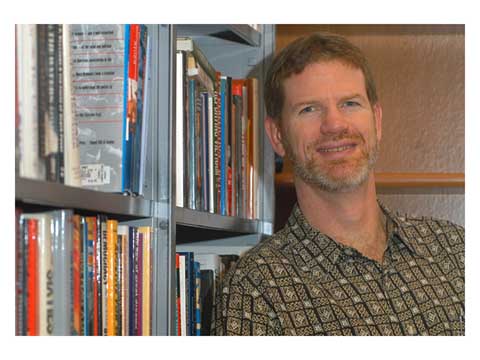| |
|
|

from the issue of January 15, 2004
|

| |
|
|
| |
Lecture to address how U.S. relates to the world

BY TOM HANCOCK, UNIVERSITY COMMUNICATIONS
With the effects of the terrorist attacks of Sept. 11, 2001, still reverberating worldwide, Thomas Borstelmann’s work is particularly relevant in understanding how the United States relates to its perceived enemies.

| | 
 
| | | Thomas Borstelmann, who started this fall as the new Elwood N. and Katherine Thompson distinguished professor of modern world history at UNL, will give the next Thompson Forum on World Issues lecture at 3:30 p.m. Jan. 26 at the Lied Center for Performing Arts. Photo by Brett Hampton.

|
Borstelmann is the first faculty member to hold the position of the Elwood N. and Katherine Thompson distinguished professorship of modern world history in the history department at UNL. He will give the next lecture in the E.N. Thompson Forum on World Issues, “America and its Enemies,” at 3:30 p.m. Jan. 26 at the Lied Center for Performing Arts. The talk, free and open to the public, will be carried live on KRNU radio, 90.3 FM, and on the web at . A pre-forum discussion with UNL historian Lloyd Ambrosius will begin at 3 p.m. in the Steinhart Room at the Lied Center.

The Thompson Forum on World Issues, named in honor of Elwood N. “Jack” Thompson, is a cooperative project of the Cooper Foundation, the Lied Center and UNL. For 16 years the E.N. Thompson Forum on World Issues has offered speakers to promote a better understanding of world issues. Borstelmann’s talk is also sponsored by the UNL Department of History.

The Sept. 11 attacks make it important to understand the background to the war on terrorism and the way the United States perceives not only the countries of the Middle East, but the general international scene, Borstelmann said. His talk will address the European response - to the attacks and the U.S. response - and how it has complicated those countries’ relationship with the United States.

Borstelmann’s recent books include The Cold War and the Color Line: American Race Relations in the Global Arena, in which he examines how the U.S. government responded during the post-1945 era to the rising demands for racial equality at home, in the civil rights movement, and abroad, in the decolonization movement. He argues that for U.S. policymakers these were two sides of the same coin, and that waging the Cold War on behalf of the “free world” required moving away from racial discrimination and inequality.

Borstelmann also co-wrote Created Equal: A Social and Political History of the United States, a new U.S. history textbook. The authors emphasize themes of cultural diversity, economic power, the environment and international relations.

Borstelmann is writing a book about the United States and the world in the mid-1970s. The book will focus on issues of democratic and anti-colonial reform, the spread of feminism, environmentalism and the resurgence of religious faith and its impact on American politics. It will also focus on how Americans of this era thought about and engaged the world, Borstelmann said

Borstelmann also conducts research on globalization and the process of international economic integration, including the United States’ place in an increasingly unified world, and protests by opponents of that process.

“As a historian I am committed to structure and the more dramatic and obvious cultural manifestations of cultural change,” Borstelmann said, including an examination of the underlying structures of economic power, who they benefit, and who has control and influence.

After earning his bachelor’s degree in 1980 from Stanford University, Borstelmann taught high school for four years in Washington state and Colorado. He then entered graduate school at Duke University, where he earned his doctorate in 1990.

Borstelmann became a full professor in 2003 at Cornell University, where he worked for 12 years before coming to Nebraska to fill the Thompson professorship in fall 2003.

The professorship is funded by the endowment of the Thompsons, longtime supporters of international education at UNL, through the Cooper Foundation. The endowment of $300,000 pays $15,000 per year, funding which is matched by the Othmer-Topp endowment. According to the professorship, the recipient shall be a distinguished scholar of world history who addresses contemporary trends in political, economic, social and cultural affairs as they relate to world history and international relations.
GO TO: ISSUE OF JANUARY 15
NEWS HEADLINES FOR JANUARY 15
Journalist to kick off King week events
Lecture to address how U.S. relates to the world
Roadwork to change traffic flow on campus
Cattle prices same as this time last year
Lectures on natural resources, water issues begin Jan. 21
731595S55X
|
|
|
|
|
|
|
|